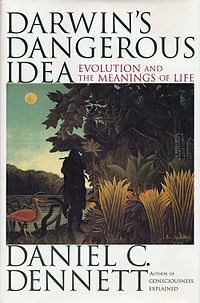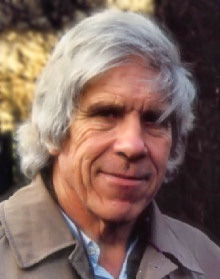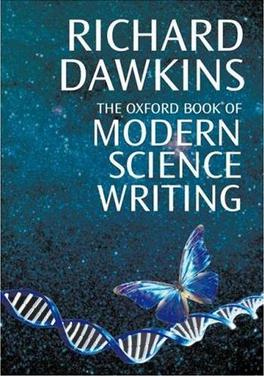
Darwin's Dangerous Idea: Evolution and the Meanings of Life is a 1995 book by the philosopher Daniel Dennett, in which the author looks at some of the repercussions of Darwinian theory. The crux of the argument is that, whether or not Darwin's theories are overturned, there is no going back from the dangerous idea that design might not need a designer. Dennett makes this case on the basis that natural selection is a blind process, which is nevertheless sufficiently powerful to explain the evolution of life. Darwin's discovery was that the generation of life worked algorithmically, that processes behind it work in such a way that given these processes the results that they tend toward must be so.
A meme is an idea, behavior, or style that spreads by means of imitation from person to person within a culture and often carries symbolic meaning representing a particular phenomenon or theme. A meme acts as a unit for carrying cultural ideas, symbols, or practices, that can be transmitted from one mind to another through writing, speech, gestures, rituals, or other imitable phenomena with a mimicked theme. Supporters of the concept regard memes as cultural analogues to genes in that they self-replicate, mutate, and respond to selective pressures. In popular language, a meme may refer to an Internet meme, typically an image, that is remixed, copied, and circulated in a shared cultural experience online.
Memetics is a theory of the evolution of culture based on Darwinian principles with the meme as the unit of culture. The term "meme" was coined by biologist Richard Dawkins in his 1976 book The Selfish Gene, to illustrate the principle that he later called "Universal Darwinism". All evolutionary processes depend on information being copied, varied, and selected, a process also known as variation with selective retention. The conveyor of the information being copied is known as the replicator, with the gene functioning as the replicator in biological evolution. Dawkins proposed that the same process drives cultural evolution, and he called this second replicator the "meme," citing examples such as musical tunes, catchphrases, fashions, and technologies. Like genes, memes are selfish replicators and have causal efficacy; in other words, their properties influence their chances of being copied and passed on. Some succeed because they are valuable or useful to their human hosts while others are more like viruses.

Richard Dawkins is a British evolutionary biologist, zoologist, science communicator and author. He is an emeritus fellow of New College, Oxford, and was Professor for Public Understanding of Science in the University of Oxford from 1995 to 2008. His 1976 book The Selfish Gene popularised the gene-centred view of evolution, as well as coining the term meme. Dawkins has won several academic and writing awards.

The Selfish Gene is a 1976 book on evolution by ethologist Richard Dawkins, in which the author builds upon the principal theory of George C. Williams's Adaptation and Natural Selection (1966). Dawkins uses the term "selfish gene" as a way of expressing the gene-centred view of evolution, popularising ideas developed during the 1960s by W. D. Hamilton and others. From the gene-centred view, it follows that the more two individuals are genetically related, the more sense it makes for them to behave cooperatively with each other.

The Blind Watchmaker: Why the Evidence of Evolution Reveals a Universe without Design is a 1986 book by Richard Dawkins, in which the author presents an explanation of, and argument for, the theory of evolution by means of natural selection. He also presents arguments to refute certain criticisms made on his first book, The Selfish Gene. An unabridged audiobook edition was released in 2011, narrated by Richard Dawkins and Lalla Ward.

William Donald Hamilton was a British evolutionary biologist, recognised as one of the most significant evolutionary theorists of the 20th century. Hamilton became known for his theoretical work expounding a rigorous genetic basis for the existence of altruism, an insight that was a key part of the development of the gene-centered view of evolution. He is considered one of the forerunners of sociobiology. Hamilton published important work on sex ratios and the evolution of sex. From 1984 to his death in 2000, he was a Royal Society Research Professor at Oxford University.

The Extended Phenotype is a 1982 book by the evolutionary biologist Richard Dawkins, in which the author introduced a biological concept of the same name. The book’s main idea is that phenotype should not be limited to biological processes such as protein biosynthesis or tissue growth, but extended to include all effects that a gene has on its environment, inside or outside the body of the individual organism.

George Christopher Williams was an American evolutionary biologist.
The gene-centered view of evolution, gene's eye view, gene selection theory, or selfish gene theory holds that adaptive evolution occurs through the differential survival of competing genes, increasing the allele frequency of those alleles whose phenotypic trait effects successfully promote their own propagation. The proponents of this viewpoint argue that, since heritable information is passed from generation to generation almost exclusively by DNA, natural selection and evolution are best considered from the perspective of genes.
Mark Ridley is a British zoologist and writer on evolution.
Robert Ludlow "Bob" Trivers is an American evolutionary biologist and sociobiologist. Trivers proposed the theories of reciprocal altruism (1971), parental investment (1972), facultative sex ratio determination (1973), and parent–offspring conflict (1974). He has also contributed by explaining self-deception as an adaptive evolutionary strategy and discussing intragenomic conflict.
Helena Cronin is a British Darwinian philosopher and rationalist. She is the co-director of the Centre for Philosophy of Natural and Social Science and the Darwin Centre at the London School of Economics. Her 1991 book, The Ant and the Peacock: Altruism and Sexual Selection from Darwin to Today brought her public attention; she has published and broadcast widely since.

The Meme Machine is a popular science book by Susan Blackmore on the subject of memes. Blackmore attempts to constitute memetics as a science by discussing its empirical and analytic potential, as well as some important problems with memetics. The first half of the book tries to create greater clarity about the definition of the meme as she sees it. The last half of the book consists of a number of possible memetic explanations for such different problems as the origin of language, the origin of the human brain, sexual phenomena, the Internet and the notion of the self. These explanations, in her view, give simpler and clearer explanations than trying to create genetic explanations in these fields.
Alan Grafen is a Scottish ethologist and evolutionary biologist. He currently teaches and undertakes research at St John's College, Oxford. Along with regular contributions to scientific journals, Grafen is known publicly for his work as co-editor of the 2006 festschrift Richard Dawkins: How a Scientist Changed the Way We Think, honouring the achievements of his colleague and former academic advisor. He has worked extensively in the field of biological game theory, and, in 1990, devised a model showing that Zahavi's well-known handicap principle could theoretically exist in natural populations.

The Oxford Book of Modern Science Writing is an anthology of scientific writings, arranged and introduced by Richard Dawkins of the University of Oxford. Published first in March 2008, it contains 83 writings on many topics from a diverse variety of authors, which range in length from one to eight pages. All inclusions are dated post-1900, and include poetry, anecdotes, and general philosophical musings.

Dawkins vs. Gould: Survival of the Fittest is a book about the differing views of biologists Richard Dawkins and Stephen Jay Gould by philosopher of biology Kim Sterelny. When published in 2001 it became an international best-seller. A new edition was published in 2007 to include Gould's The Structure of Evolutionary Theory finished shortly before his death in 2002, and recent works by Dawkins. The synopsis below is from the 2007 publication.

The following list of publications by Richard Dawkins is a chronological list of papers, articles, essays and books published by British ethologist and evolutionary biologist Richard Dawkins.

The Selfish Genius: How Richard Dawkins Rewrote Darwin's Legacy is a 2009 book by Fern Elsdon-Baker about the history of evolutionary theory, published to coincide with the 150th anniversary of the publication of Charles Darwin's On the Origin of Species. The book provides an overview of the historical and philosophical debates that have continued throughout the history of evolutionary theory, and carry on to this day in debates surrounding the merits of gene-centric selection and group selection models. The book is particularly critical of the popular science author Richard Dawkins, claiming that he presents a brand of evolutionary theory that portrays natural selection as acting at the level of the individual gene to the exclusion of group selection models which state that it could also act at the level of organisms or species. The book also claims Dawkins embraces an outdated and prescriptive conception of evolution that actually restricts debate rather than promoting it.












